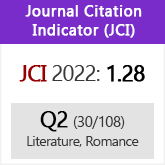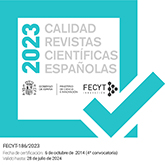Ideas de la sátira en el siglo XVIII: hacia una nueva función en el marco de la ideología ilustrada
DOI:
https://doi.org/10.3989/revliteratura.2001.v63.i126.215Abstract
The article starts with a definition of the new dimension which the satire acquires during the European Enlightenment. The authors of the 18th century try to revalue the genre and they get aware of the power of the satire to critize the former regime and to activate new political and social structures. In order to analyze if these ideas have the same resonance in the Spain of the 18th century the author undertakes a diachronical search which aims at discovering comments on the theory of satire. The investigation includes the works of Luzán, the polemics about Gerundio de Campazas, the statements of neoclassical authors and the satirical press. In most of the texts you can observe an attempt to rehabilitate a genre which lost reputation because of the praxis inherited from the preceding century. The rehabilitation undergoes a gradual process of secularization. Step by step it overcomes the religious context in which it had been captured till then and adopts a new terminology and reasoning which corresponds to ideology of the enlightenment. The analysis shows that Spain shares the ideas of the satire which were established in the European Enlightenment.
Downloads
Download data is not yet available.
Downloads
Published
2001-12-30
How to Cite
Uzcanga Meinecke, F. (2001). Ideas de la sátira en el siglo XVIII: hacia una nueva función en el marco de la ideología ilustrada. Revista De Literatura, 63(126), 425–459. https://doi.org/10.3989/revliteratura.2001.v63.i126.215
Issue
Section
Studies
License
Copyright (c) 2001 Consejo Superior de Investigaciones Científicas (CSIC)

This work is licensed under a Creative Commons Attribution 4.0 International License.
© CSIC. Manuscripts published in both the printed and online versions of this Journal are the property of Consejo Superior de Investigaciones Científicas, and quoting this source is a requirement for any partial or full reproduction.All contents of this electronic edition, except where otherwise noted, are distributed under a “Creative Commons Attribution 4.0 International” (CC BY 4.0) License. You may read here the basic information and the legal text of the license. The indication of the CC BY 4.0 License must be expressly stated in this way when necessary.
Self-archiving in repositories, personal webpages or similar, of any version other than the published by the Editor, is not allowed.














